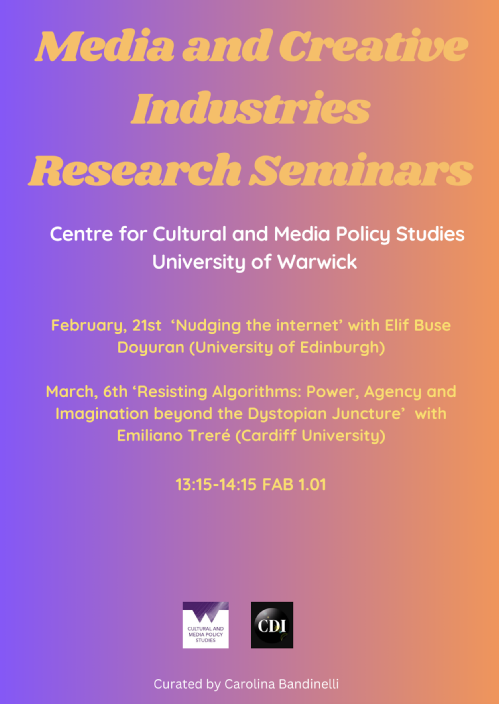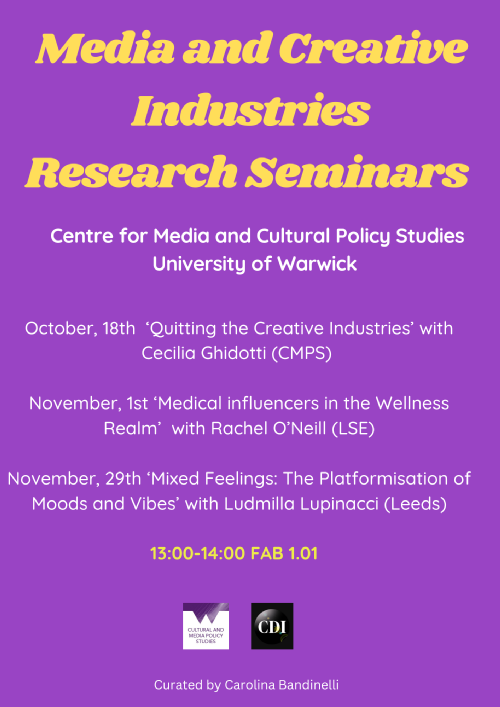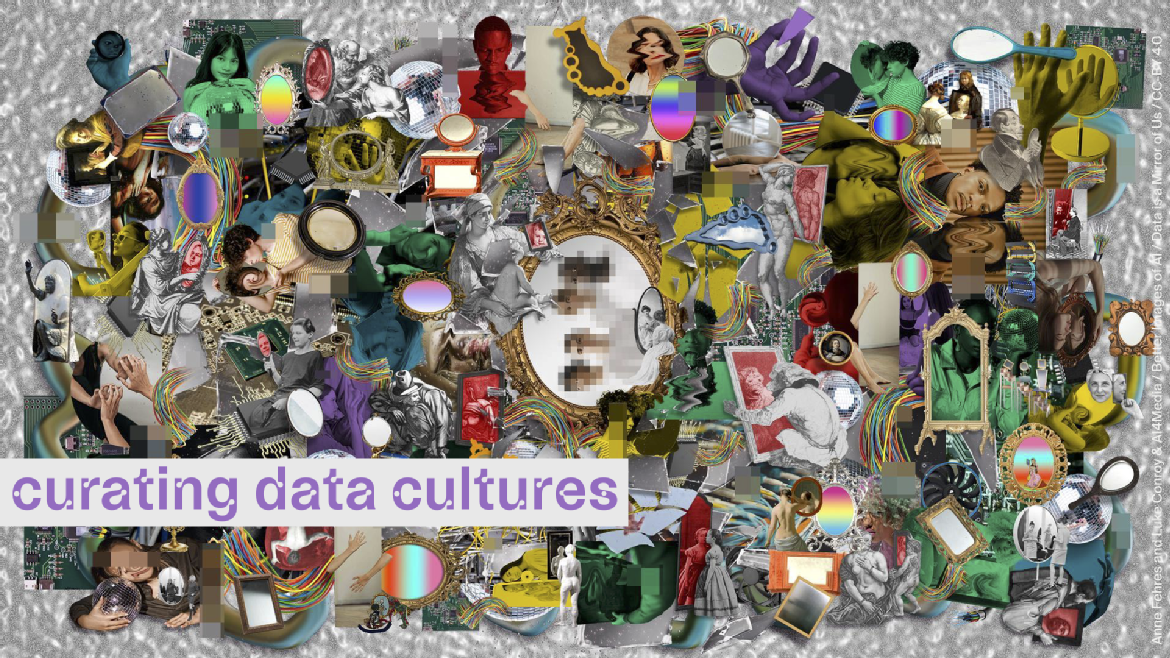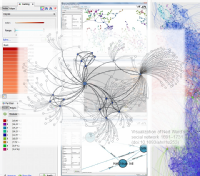News & Events
Artificial Societies

Friday 7th March 2025, 9:30-17:30, Oculus Building (OC0.04), University of Warwick
Social life is increasingly being the object of interventions from engineering and economics. Platforms, AI and Big Tech are driving a growing engineering of the social, often without transparency and accountability. This event encourages interdisciplinary dialogue to problematise our present, explore alternatives, and address societal concerns amid growing public backlash against Big Tech.
Keynote Speakers: Noortje Marres and Mona Sloane
This event is co-organised by the Centre for Interdisciplinary Methodologies with the Edinburgh Futures Institute in collaboration with the Centre for Digital Inquiry and the International Sociological Association’s Working Group 10 on Digital Sociology.
I Quit! Between Resignation & Refusal
On this episode of CDI-TV, we're quiet quitting before joining the great resignation - or perhaps we're mad as hell and we're not gonna take it anymore! Join us in person or online for a live research conversation in which we try to uncover what quitting and resignation tell us about our relationship to the meaning, practices and politics of work culture, and whether giving up has anything in common with anti-work, neo-Luddism and other strategies of refusal. This hybrid event will be an open conversation between Cecilia Ghidotti, a scholar of quitting in the cultural industries, and Craig Gent, a researcher and activist working in the tradition of operaismo.
Location: FAB1.16 and CDI-TV.
Time: Monday of 23rd June, 17:00-18:00
Giessmann - Blockchain vs. AI: Doing Network History in Our Current Situation

Public Talk by Sebastian Giessmann
Location: FAB0.08
Time: Wednesday 25th of June, 10:00-11:00
Both as imaginary and material network technologies, blockchain and ‘artificial intelligence’ tend to clash and mingle at the same time. Current neoconnectionist AI and blockchains follow very different cultural logics, just as neural networks differ from peer-to-peer networks sociotechnically. Maximum data intensity, large language models, tokenized media objects, modification of algorithms by data, operational statistics, plus the variation of existing patterns in the case of AI – data immutability, encryption, token economies and exact processing of algorithmic instructions in the case of blockchain. Together, blockchain and neoconnectionist AI are about to form what I call a seventh historical layer within my work on The Connectivity of ThingsLink opens in a new window of network cultures. Even within our current situation we cannot draw close the net in which we stand (Walter Benjamin). Blockchain and AI are infrastructured by a deep time of sociotechnical networks, computing|computation, and their media materialities.
Yet currently blockchain and AI not only compete for parallel distributed processing power in data centres. They both share energy-intensive, extractive strategies that drive the booms and busts of too-late capitalism (Anna Kornbluh). While their network imaginaries are still being contested, naturalization and habitualisation happen at an ever-increasing pace. Sometimes, blockchain is now promoted as a slowing-down counter-infrastructure to AI's accelerationist, generative media and its models. The talk is going to take a close look at controversial cases like Worldcoin, which is supposed to afford for a biometrical “proof-of-human” that attaches a digital identity to online content. While the cultural logics of blockchain and AI might seem to differ almost entirely on the infrastructural level, they are currently serving as a match made in hell when it comes to their political and economic appropriation. So how can we revitalize network cultures to inhabit a liveable seventh layer of network history?
Co-hosted with the Centre for Interdisciplinary Methodologies (CIM)
Curating Data Cultures: Workshop
Co-hosted by the Curating Data CulturesLink opens in a new windowLink opens in a new window project and the Centre for Digital InquiryLink opens in a new windoLink opens in a new window
Date: Tuesday 9 July 2024, 13:00 - 18:00
Location: Junction (JX2.02) and FAB building (FAB3.26 and FAB4.52), University of Warwick
This afternoon workshop will explore the transformative potential of curating open data cultures across the humanities and social sciences and the practicalities involved in this.
Two leading scholars in digital humanities will give opening presentations in which they draw on their own work to explore wider issues raised by open qualitative inquiry in contemporary culture and society:
- Karin van Es Link opens in a new window(Media and Culture Studies, University of Utrecht), project lead Humanities in the Utrecht Data School
- Barbara McGillivray (Computational Linguistics, KCL), Editor in Chief Journal of Open Humanities Data
The second half of the workshop will take the form of interactive data sessions where experts and newcomers to open data in the humanities and social sciences will evaluate the practical benefits and challenges of making qualitative data and research open. This will be done through a structured exploration of data sets submitted in response to the Call for DatasetsLink opens in a new window recently issued by the Curating Data Cultures team.
Registration: If you would like to attend, please register by emailing matias.valderrama-barragan@warwick.ac.uk before Wednesday July 3 close of play. We will send an more detailed programme to all registered participants before the event.
Remote participation in the workshop is possible upon request.
Funded by the University of Warwick's Enhancing Research Cultures FundLink opens in a new window
Curating Data Cultures: Call for Datasets
In this project, we invite researchers from across the University of Warwick to work with us to further develop and enhance practices of data curation that advance the goals of open interpretative research.
A project by the Centre for Interdisciplinary MethodologiesLink opens in a new windowLink opens in a new window, the LibraryLink opens in a new window,,Link opens in a new window, Research ComputingLink opens in a new windowLink opens in a new window and the Centre for Digital Inquiry.
The call to "open up" our data can be heard all around, as part of a wider drive across sectors to make knowledge more accessible, usable and engaging. While these wider objectives are shared by many, the sciences have historically provided the models for what "open data" means in practice. Open data guidelines and tools tend to be designed with quantitative methods in mind.
Against this backdrop, this research culture project asks: what are the benefits of openness for intepretative research? What practical strategies of data curation can help us realise these benefits? What kind of data infrastructures, data practices and data cultures are needed to enable open inquiry in the humanities and social sciences? What forms of data stewardship - what cultures of data curation - can help us take open inquiry to the next level?
To answer these questions, this project puts the data needs of qualitative researchers at Warwick on centre stage. By inviting researchers from across the University to submit their own data sets to our project, we will be able to adopt a case-based approach and work with them to develop strategies of data stewardship in open inquiry that suit the needs of qualitative research.
What we are looking for
We invite all researchers and scholars from across the University of Warwick and beyond to send us data sets which they have used or are planning to use for interpretative research.
Please use the form below to submit your data set by June 11. We welcome links to descriptions of data sets as well as data files themselves.
Once we have received your data sets, the Curating Data Cultures teamLink opens in a new windowLink opens in a new window will review all submissions to evaluate their potential challenges for open interpretative research.
Next, we will select up to 5 datasets for an in-depth case study. We will work with you, qualitative researchers at Warwick, to identify concrete data curation strategies that can help you realise the benefits of your data for open inquiry.
All participants will receive feedback by mid-June and be notified whether their project was selected for a follow-up case study.
We will present the project findings during an open event at the University of Warwick in September 2024, to which all project participants will be invited.
Funded by the University of Warwick's Enhancing Research Cultures FundLink opens in a new window
Richard Rogers, Post-Truth Spaces: Studying Authenticity and Influence on the Internet
Public Lecture
This talk seeks to contribute to the study of authenticity and influence on the internet by exploring a series of techniques for the examination of online spaces where actors and information are either difficult to authenticate and verify or are known to verification specialists and fact checkers as problematic. Such online realms we refer to as post-truth spaces, which references the rise of the discourse of ‘alternative facts’, especially as part of a counter-program for ‘asserting political dominance’ and influence. The contribution is methodological as well as conceptual. In the technique I locate and discuss clutches of actors and websites as well as social media posts grouped together on the basis of their dense inter-referencing and their verification assessment based on digital investigation techniques. Their influence is gauged by the extent to which they penetrate or overlap onto mainstream spaces online. Conceptually, the post-truth space is among other spaces where ‘problematic information’ holds sway and information circulation, campaigning and operations are undertaken. Among these are the ‘alternative influence network’, ‘fake news’ engagement spaces, coordinated inauthentic behaviour campaigns as well as participatory propaganda circulation. As with a post-truth space, which as I discuss is a broader term, each of these is mapped through techniques that demarcate, chart or otherwise render them as spaces of interest online.
Date: Monday, 11/03/2024; Time: 17:00-19:00; Room: OC1.09.
Media and Creative Industries Seminar Series @ the Centre for Cultural and Media Policy Studies (Spring Term)
Warwick’s Centre for Cultural and Media Policy Studies (CMPS) invites you to its Media and Creative Industries Research Seminar Series for Spring Term, curated in collaboration with the Centre for Digital Inquiry (CDI). All welcome. Details below.

Nudging the Internet - Elif Buse Doyuran (University of Edinburgh)
How do platforms make us click, like, book, or buy? The popularised view has it that they deploy small and subtle suggestions to shape our actions in powerful and predictable ways. These ‘nudges’ target universal cognitive and behavioural biases and are refined through proprietary data analytics and experimentation systems. As such, they are based on insights from behavioural sciences. Or, rather, they represent a mode of platform governance. Or are they routine business practice? This talk aims to clarify what nudging is, how it works, and why it is so prevalent. Drawing on interviews with people whose job is to nudge users and consumers online, it explores how the work of designing interactions and prompting actions is organised. It finds that nudging is not a set of specialised techniques that moved into the field from outside, nor can it be fully understood as a mode of governance. Instead, ubiquitous nudging emerges as a mundane ‘effect’ of the practical arrangements that make up the platform economy and that reinforce incremental and testable changes into its products.
February, 21st 2024 1:15-2:15pm FAB 1.01
Elif Buse Doyuran is a PhD candidate in Sociology at the University of Edinburgh and a research affiliate for the Data Civics Observatory at Edinburgh Futures Institute. She works on the sociology of platform economies. Drawing on fieldwork and a series of interviews with product developers and marketers, her doctoral research examines the epistemologies and practical organisation of ‘nudging’ across the internet, to understand how platforms move our actions. The first article from this research, ‘Nudge goes to Silicon Valley: Designing for the disengaged and the irrational,’ was recently published in the Journal of Cultural Economy. Along with her colleagues, she has co-founded and convenes The Platform Social, a research network of postgraduate and early career researchers working on digital society and economy. She holds an MSc from London School of Economics and Political Science.
Resisting Algorithms: Power, Agency and Imagination beyond the Dystopian Juncture - Emiliano Treré (Cardiff University)
In an age where algorithms shape our every interaction, understanding how to navigate and resist their influence is crucial. This talk is based on the findings of a 5-year research project that culminated in the book “Algorithms of Resistance: The Everyday Fight against Platform Power” (co-written with T. Bonini for MIT Press, 2024). I will shed light on how global workers, influencers, and activists develop tactics of algorithmic resistance by appropriating and repurposing the same algorithms that control our lives. Through rich ethnographic insights spanning the Global North and the South, this talk unveils how we are not harmless against algorithmic power. At the same time, I caution about not romanticizing algorithmic resistance considering the profound power imbalance inherent in the platform society.
March, 6th 2024 1:15-2:15pm FAB 1.01
Emiliano Treré is a Reader in Data Agency and Media Ecologies and Director of International Development at Cardiff University’s School of Journalism, Media and Culture. He’s a widely cited author in digital activism, critical data/algorithm studies and digital disconnection with a focus on Latin America and the Global South. He co-founded the ‘Big Data from the South’ Initiative and co-directs the Data Justice Lab. His monograph Hybrid Media Activism (Routledge, 2019) won the Outstanding Book Award of the ICA Interest Group ‘Activism, Communication and Social Justice’. Data Justice (Sage, 2022), his latest co-authored book, was the runner up of the Sage Social Justice Book Award. His latest co-authored book, Algorithms of Resistance (MIT Press, 2024), explores collective forms of power, agency and resistance in the platform society. For more info on his work: emilianotrere.com
Media and Creative Industries Research Seminars Series - CDI @ Warwick's Centre for Cultural and Media Policy Studies (Winter Term)

Narratives from the creative sector often center on those who, despite the challenges, manage to keep going and eventually thrive in the cultural sector or as creative professionals. The focus on quitting brings under the spotlight the others, those who, after a series of attempts at staying in the creative industries, left the sector. This presentation centers on the case of Italian graduates from a creative writing program, and it investigates their biographies and reasons for quitting. It argues that in their cases, quitting depended on a set of expectations about the meanings and practices of work in culture and on their refusal to adhere to a series of implicit rules that they had to conform to if they wanted to stay in the publishing industry.
October, 18th - 13:00 - 14:00 FAB 1.01
Medical Influencers in the Wellness Realm: Lifestyle Expertise and the Wuestion of Credentials - Rachel O'Neill (LSE)
Existing literature on wellness influencers takes for granted that such individuals lack accredited expertise, and further contends that their popularity indexes widespread public distrust in experts generally and medical professionals especially. These arguments overlook the existence of medical doctors who are themselves wellness influencers — who share dietary and lifestyle advice on social media, participate in industry trends and conventions, and monetise their followings through sponsored content and other commercial ventures. In this talk I introduce the figure of the medical influencer or ‘medfluencer’ as an object of critical enquiry, using a series of case study subjects from the UK context. Demonstrating the extent to which such individuals reproduce rather than resolve the tensions said to characterise their unaccredited counterparts, I argue that credentials are not in themselves sufficient to undo the problematics associated to wellness influencing and, moreover, may open out new realms of conflict and contradiction.
November 1st, FAB 1.01 13:00 - 14:00
Mixed Feelings: on the Platformisation of Moods and ‘Vibes’ - Ludmilla Lupinacci (Leeds)
Over the past few years, digital platforms have increasingly tailored their content to both respond to and create certain moods, vibes, atmospheres or ambiences (Roquet 2016). This trend has indeed begun to spark discussion on whether platforms such as TikTok represent the end of ‘social media’ as we know it, as the centrality of networks and interpersonal interactions is replaced by self-indulgent activities such as mindless scrolling. Engaging with those debates, in this presentation I will offer a critical assessment of social media’s current experiential turn and its specificities, and propose a critical-phenomenological framework for the theorisation of this ongoing shift precisely at the intersection of embodied affect and the political economy of platformisation. I take moods, ‘vibes’ and their mediation to be both foundational to embodied experience and yet deeply embedded in socio-technical and material practices (Highmore 2013). In this regard, this presentation also aims to engage with a discussion on how, through processes of datafication, personalisation, standardisation, and algorithmitisation (Stark 2020) bodily states such as moods become practices that can be managed through social media once those technologies become central to contemporary ‘regimes of sensory calibration’ (Starosielski 2021).
November, 29th 13:00 - 14:00 FAB 1.01
Social Networks: Exploring and Visualising with Gephi
Do you want to learn a new skill in this Autumn Term? Network analysis offers an interesting way of exploring and visualising networks between social, economic, and political actors.
In this workshop, we explore how to use the Gephi software to visualise and understand a 17th Century network. We will explore the network and consider what the patterns in the data suggest. You are encouraged to prepare for the session by reading the links from the Workshop Web Page, but this is not essential if you do not have time beforehand.
This workshop will be led by Dr Godwin Yeboah and Dr James Tripp who are Senior Research Software Engineers and part of the "Research Computing" team in the Research and Technology Platforms (they are also part of the Centre for Digital Inquiry).
Please read more (and register if interested or share) using the following webpage.
Mastodon Research Event (CFP): June 2023
Call for Presentations




